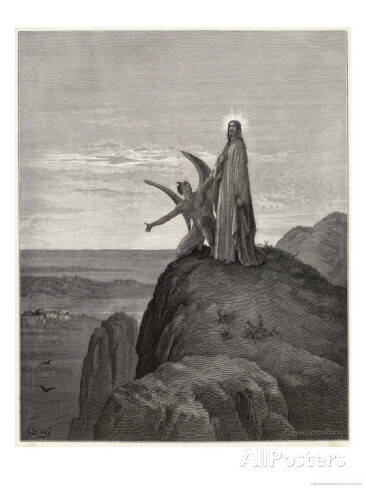During the next six weeks, we will hear often about traditional Lenten practices -- prayer, fasting, and almsgiving, as well as the temporary relinquishing of something we crave or depend upon. These practices, as Catholics know, are meant to purge our selfishness and sin and inspire our hunger for the nourishment of the Gospel.
But like all Christian holidays, these practices can conceal the spiritual truths they are supposed to illuminate. We can become so concerned with fasting on Fridays, with precisely adhering to our Lenten refusals, we take little notice of the significance of these forty days for the life of a disciple.
Lent will test our spiritual strength. It may even bring us to the brink of spiritual danger. The forty days recalls the time that Jesus dwelled in the desert, the time in which Jesus, as Scripture tells us, underwent the devil's temptations. During Lent, the Church encourages us to experience this wilderness, to feel something of the famishment and deprivation that come with isolation and self-denial. We are to realize, in our own way and time, that man does not live by bread alone.
Over the next forty days, we should expect nothing less than what Christ faced. We should expect forces that oppose our resolutions to right living, our desires to embody the will of God. This is why the readings on Mardi Gras call for steadfastness. The First Letter of St. Peter, written in the context of affliction, tells us,
[G]ird up your minds, be sober, set your hope fully upon the grace that is coming to you at the revelation of Jesus Christ. As obedient children, do not be conformed to the passions of your former ignorance, but as he who called you is holy, be holy yourselves in all your conduct; since it is written, "You shall be holy, for I am holy."
In entering into the desert, we enter into what The Screwtape Letters refer to as "trough periods." Speaking of his enemy (God), Screwtape says:
Sooner or later He withdraws, if not in fact, at least from their conscious experience, all those supports and incentives. He leaves the creature to stand up on its own legs--to carry out from the will alone duties which have lost all relish. It is during such trough periods, much more than during the peak periods, that it is growing into the sort of creature He wants it to be. Hence the prayers offered in the state of dryness are those which please Him best. We can drag our patients along by continual tempting, because we design them only for the table, and the more their will is interfered with the better. He cannot 'tempt' to virtue as we do to vice. He wants them to learn to walk and must therefore take away His hand; and if only the will to walk is really there He is pleased even with their stumbles.
If over the next few weeks we find ourselves feeling low, maybe abandoned and lethargic, we would do well to keep in mind Screwtape's unintended advice. Pray when our prayers seem least heard, praise Him even if he seems gone -- and relish the God who loves us even as we stumble.









Mr. Snowden,
Thank you for reading and commenting! I appreciate your kind words.